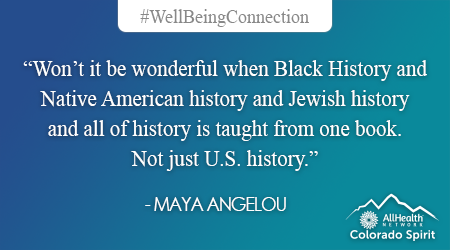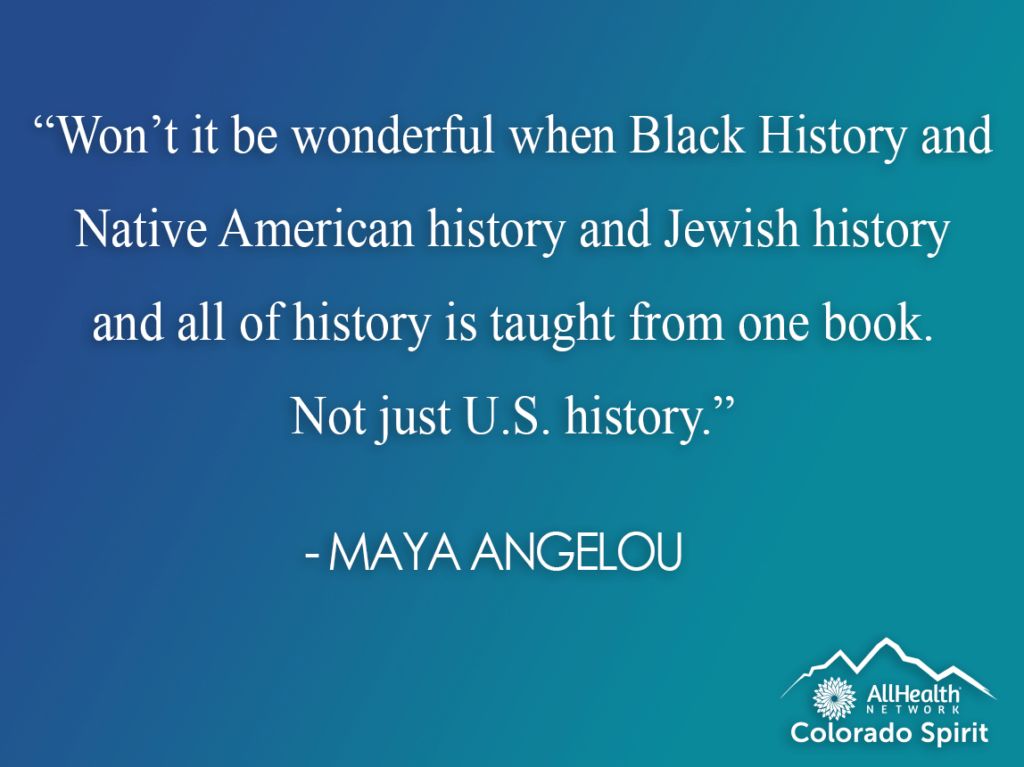Welcome to the Weekly Well-Being Connection! Each week we will share advice from our clinical experts on ways to care for your mental health and well-being throughout COVID-19.
We are excited to have Colorado Spirit Counselors, Samaria Neely and Chelsea Nibert, writing this week’s post. Thank you both!
Throughout the course of the pandemic, racial disparities and health care inequity have been at play. As our communities move into vaccine distribution, the Colorado Spirit team continues to discuss health care equity and how we can contribute to equity and make sure our supports are widely available.
We are engaging in conversations and frequent brainstorming sessions, discussing how systems contribute to health care inequities. In honor of Black History Month, we sadly acknowledge that most US history classes spend a very small percent of time covering Black history. In 2015, a study from the National Museum of African American History and Culture and Oberg Research found that on average, only 8-9% of history education in U.S. schools is devoted to Black history. African American history is grossly underrepresented, and the information taught is often skewed or misrepresented. We have a long way to go to repair the education system to adequately represent African American history.
Black History Month is a perfect time to celebrate all of the wins that have come out of the black community over the years. The strife and struggle that people of color have undergone must be honored by highlighting the successes that have propelled our nation forward due to the various discoveries, inventions and contributions of the Black community.
Below, we recognize a series of Black History facts that should have been taught in school.
Inventions/Discoveries:
- A Black women invented the sanitary belt. Mary Beatrice Davidson Kenner was quite the inventor at an early age, but her most innovative creation was the sanitary belt. Because of Mary’s skin color, an interested manufacturing company failed to market her product, and the great invention wasn’t used until 1956 – 30 years after its creation. She continued inventing and filed 5 more patents, the most from any African American woman in history.
- In 1951, Henrietta Lacks’ cancer cells led to major discoveries in medical research. There was a novel and later a movie starring Oprah Winfrey as Henrietta’s daughter called The Immortal Life of Henrietta Lacks which explained how Henrietta’s HeLa cells underpin much of modern medicine. They have been involved in key discoveries in many fields, including cancer, immunology and infectious disease.
- The first successful open-heart surgery was performed in 1893 by a black surgeon named Dr. Daniel Hale Williams.
Culture:
- Motown Records was founded by Berry Gordy Jr. as Tamla Records on January 12, 1959, and incorporated as Motown Record Corporation on April 14, 1960.
- Betty Boop was based on a Black jazz singer named Esther Jones.
- Musa I of Mali is considered the richest man in history.
- African Americans had their own genre of film called Race Film. It was called Race Film because from 1915 to the early 1950s these films were produced by and made for African Americans.
- Ida B. Wells led a movement against lynching in the 1890s through her informative essays and brave activism.
- The youth of Birmingham, Alabama led a nonviolent Children’s Crusade in protest of segregation within the school system in 1963.
Government:
- John Rock was the first African American Supreme Court Lawyer.
- The Harlem Hellfighters spent 191 days in the trenches during World War I, more than any other American unit.
- Martin Luther King Jr, was not the first African American to win the Nobel Peace Prize. That honor goes to Ralph Bunche, the political scientist and US diplomat from Detroit. He received the Noble Peace Prize in 1950 for his efforts with resolving the Arab-Israeli conflict.
- George Edwin Taylor was the first African American to run for president. He ran in 1904.
- Interracial marriage in the United States was banned in 1664 and not overturned until 1967 with the U.S. Supreme Court decision Loving v. Virginia (1967) that held that “anti-miscegenation” laws were unconstitutional.
Business:
- In 1921, “Black Wall Street” was a thriving community of black businesses.
- We know about Ford and Honda but not many people know that there is only one Black owned automobile company: CR Patterson’s & Sons.
- Katherine Johnson, Mary Jackson, and Dorothy Vaughan were the women behind the NASA space race.
One of the things we talk about in the Colorado Spirit team is, “What next?” We would like to invite you to take action. Talk about this. Give tribute to these impacts. Stay informed and eager to learn about the ongoing contributions that continue to mold our world and future generations. It is our civic duty as Americans to ensure that these successes are taught to and celebrated by future generations. Cultivating this appreciation and understanding in our youth helps promote an equitable and inclusive future for all.
Cultivating this appreciation and understanding in our youth helps promote an equitable and inclusive future for all.
See the resources below for more information on how to educate ourselves and our peers on the ongoing impacts of the Black community not just in February but, every day out of the year.
We know learning about Black history is not enough to address health care inequities, and we hope that sharing information and getting conversations going is a small step.
Would speaking to someone help?
To speak with someone in the Colorado Spirit Program about stress related to the pandemic, please call 720-707-6789 or visit our web page at www.allhealthnetwork.org/Colorado-Spirit.
AllHealth Network is continuing to provide service via telehealth or by phone and our Crisis Walk-in Center remains open 24/7. To learn more about what other community mental health centers are doing, please visit The Colorado Behavioral Health Council COVID-19 website.
If you are experiencing a mental health crisis and are in need of immediate assistance, please call the Colorado Crisis Hotline at 1-844-493-TALK (8255) or text TALK to 38255.
Resource links
- Robert Wood Johnson Foundation – What Is Inequity?
- For an excellent presentation about Racial Disparities and Health Inequities at Every Stage of COVID-19, we highly recommend this Webinar featuring Taison Bell, MD, and Sam Fullwood III.
- Black Past – The History of Allensworth, California
- Insider – African American history you probably weren’t taught in school
- Britanica – Pan Africanism
- ASALH – Black History Themes
- National Civil Rights Museum


